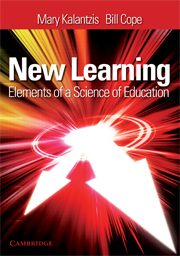Conclusion: futures of education
Summary
Changing society, New Learning
The changes occurring in the world around us are pervasive. The challenges we face as educators, profound.
Take something so ordinary and pervasive as narrative. In everyday family and community life, the narratives of gaming have now become an even bigger business than Hollywood. From the most impressionable of ages, children of the Nintendo, PlayStation and X-Box generation have become inured to the idea that they can be characters in narratives, capable of determining or, at the very least, influencing the story's end. They are content with being no less than actors rather than audiences, players rather than spectators, agents rather than voyeurs, users rather than readers of narrative. Not content with programmed radio, these children build their own play lists on their iPods. Not content with programmed TV, they read the narratives of DVD and Internet-streamed video at varying depth (the movie, the documentary about the making of the movie) and dip into ‘chapters’ at will. Not content with the singular vision of sports telecasting of mass TV, they choose their own angles, replays and statistical analyses on interactive digital TV. And not content with being mere receivers of media content, they are creators and sharers of identity laden content, at MySpace, Facebook, YouTube, or on blogs.
Old logics of teaching and learning are profoundly challenged by a social context in which these changes in media are mere symptoms of a broader and deeper change.
- Type
- Chapter
- Information
- New LearningElements of a Science of Education, pp. 228 - 240Publisher: Cambridge University PressPrint publication year: 2008



